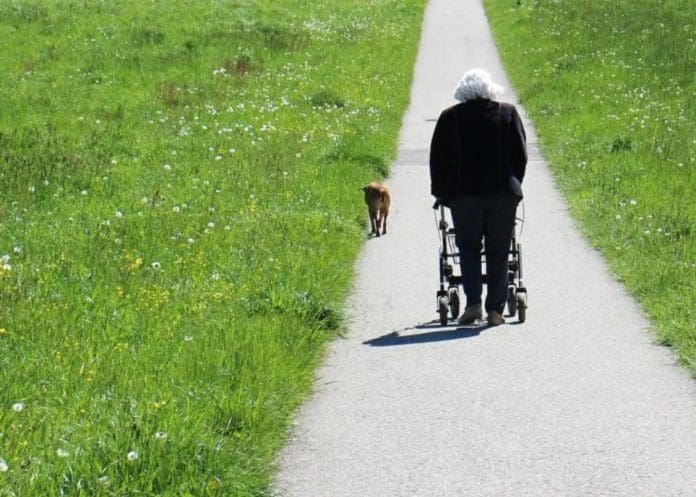The recent Supreme Court judgment and the guidance issued by the EHRC have the potential to impact older trans adults particularly hard. Some of us transitioned years or even decades ago. We’ve merged into our communities, known just as the older woman or man who lives at number 66, perhaps alone or with a partner.
We’re now at increased risk of being outed. Unlike trans people in the workplace, we have no trade unions or employee groups to fight our corner.
Our needs have been forgotten by the judges at the Supreme Court, by the EHRC, by the MPs who could ensure trans people can continue to live as their acquired genders with dignity and respect, and even by many in the wider LGBTQ+ community.
As we age, there is an increased need for medical care, whether it be at our GPs, opticians, dentists, or in hospitals, or, eventually, as recipients of social care. If medical records must record and treat us as our birth gender, we face discrimination and loss of privacy. We may be deterred from having vital health checks, putting us at risk of developing serious illness.
Treatment in hospitals and social care settings
Hospitals and social care provision were already a source of considerable anxiety for trans people prior to the Supreme Court judgment, with the author herself being subjected to poor care and discrimination in hospitals in the past. According to Age UK, this is not an isolated experience, and trans people now face the prospect of being treated on hospital wards as their gender assigned at birth.
Social care is another cause for anxiety. Older trans adults such as Helen say that “…the fear of going into a care home or nursing home… fills me full of dread.” Another, Pauline, says, “One of my fears is ending up in an old people’s home and having to be a man all the time.” There has been an increase in providing social care at home, but this brings additional worries as trans people worry about their clothing and other items leading to them being outed.
As a vocational assessor in social care, the author saw at first hand how equality and diversity, including LGBTQ+ issues, was given a high profile in learning and development in the social care sector. However, she is concerned that recent local election results and the promises made by some politicians to roll back equality and diversity training may lead to it having less emphasis in the future.
The challenges of trying to keep healthy and active
One of the ways we can stay healthy as we age is by participating in sports and active leisure, and we do have more time to do that in retirement. Having more time, though, is of little use if we cannot use changing rooms that match our gender identity or we are forced to join sports activities as our gender assigned at birth.
This also affects hobbies, leisure pursuits, and even holidays. Going to libraries, theaters, cinemas, cafes, museums, and coach tours means going to the loo, which tends to happen with increasing frequency as we age, and we now have to wonder how to meet those needs, following the judgment.
Physical changes in the ageing body
Most older trans adults do not want a verbal or physical confrontation with some burly security guard or an antagonistic gender-critical person eager to exclude us. The author is well aware from her professional experience that older adults are less steady and mobile on their feet and at increased risk of falls, even if unintended, and in older adults these can often lead to life-changing and life-limiting injuries.
Older adults, trans or not, also often experience changes in secondary sex characteristics, with some women suffering hair loss while developing facial hair and reductions in breast size, and men becoming shorter and with reduced muscle mass. This can put all older adults at risk of being challenged, either because they are trans or are perceived as such. The thought of anyone potentially being arrested, as some commenters on social media are demanding, is genuinely frightening.
The right to age with dignity within society
As we age, we cannot rely on having our own transportation, either because the cost of driving is too expensive or we lose our licences for medical reasons. Public transport may be less expensive due to bus passes or railcards, but this is of little use if bus and railway stations force us to use facilities which match our gender assigned at birth.
Our peer groups and friendship circles are often based on gender. The sudden realisation that the Nell you’ve known is trans can negatively affect those relationships and lead to social isolation and loneliness, which “…is bad for our physical and mental health, being linked to acceleration of frailty and increased risk of heart disease, stroke, and dementia.”
Even staying in and watching TV or listening to the radio does not offer much of a refuge. Jeremy Vine, GB News, and other outlets and presenters, pour hatred and contempt into our living rooms, and social media is a cesspit of hatred with accusations of being a paedophile and mentally ill awaiting any trans person who does not keep silent.
All of us will hopefully get to live to a ripe old age. Trans older adults deserve to enjoy their later years as much as anyone, without fear of being outed and shunned, and we should not be forced into becoming recluses.
This article was published with the approval of Neil Stockton at Yorkshire Bylines to whom we are extremely grateful.







